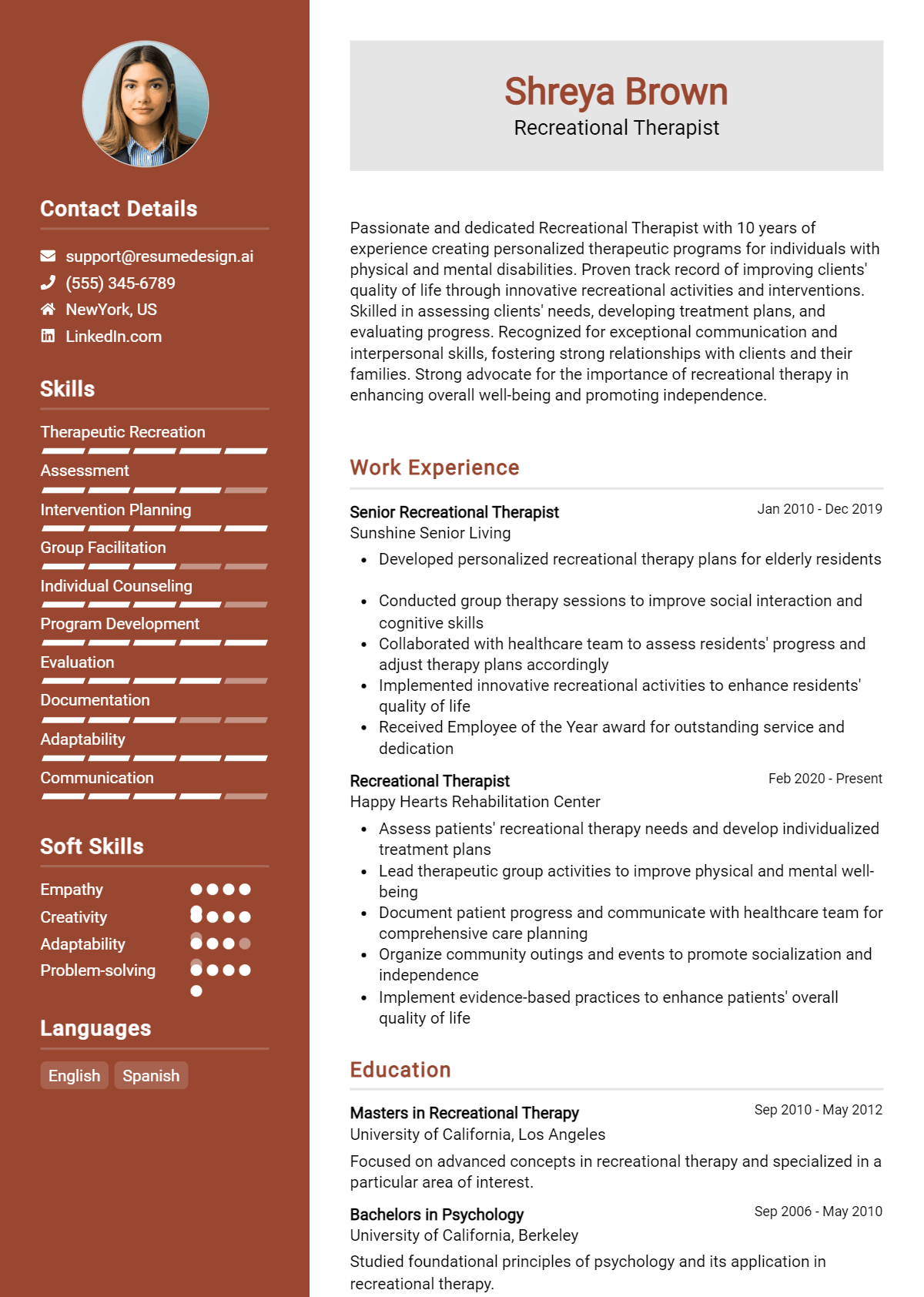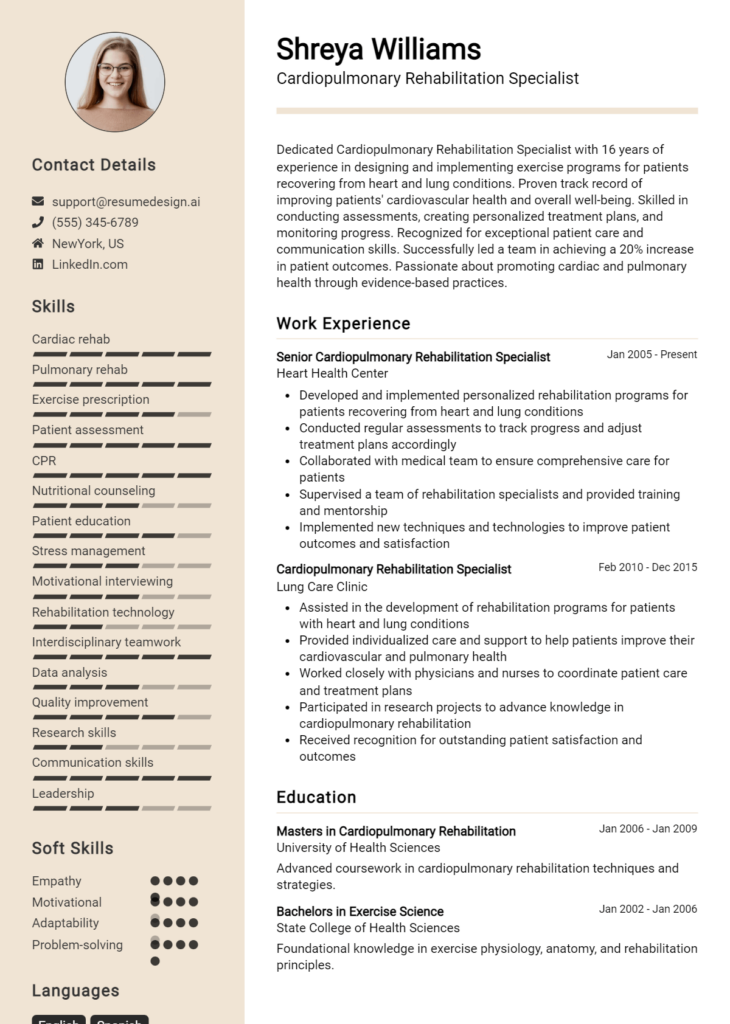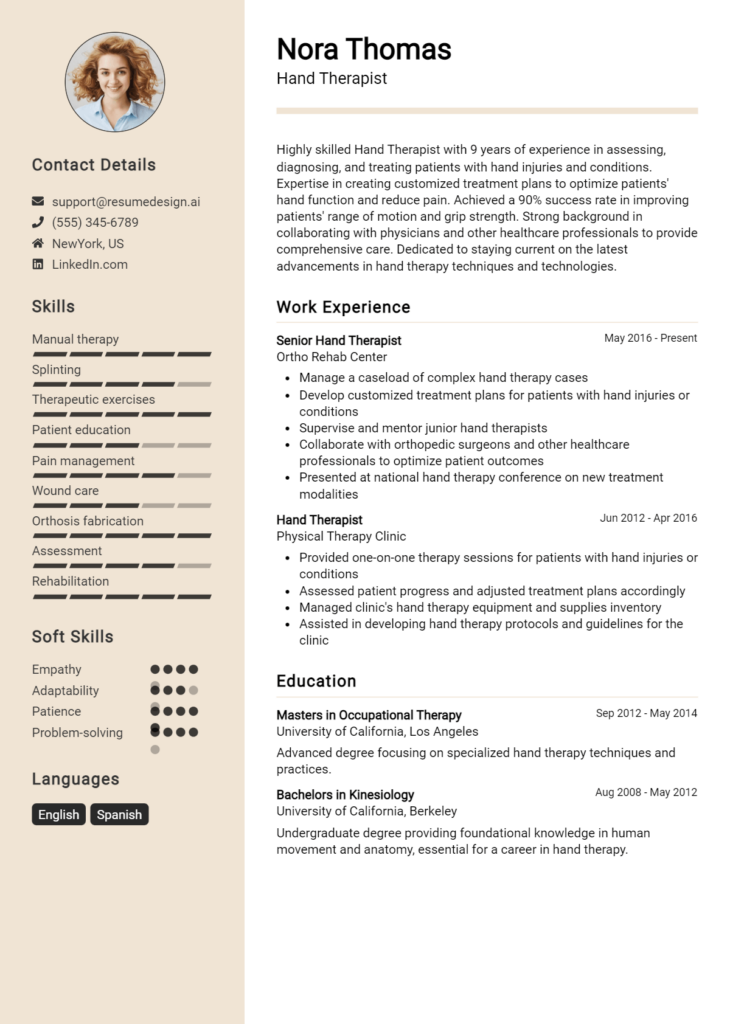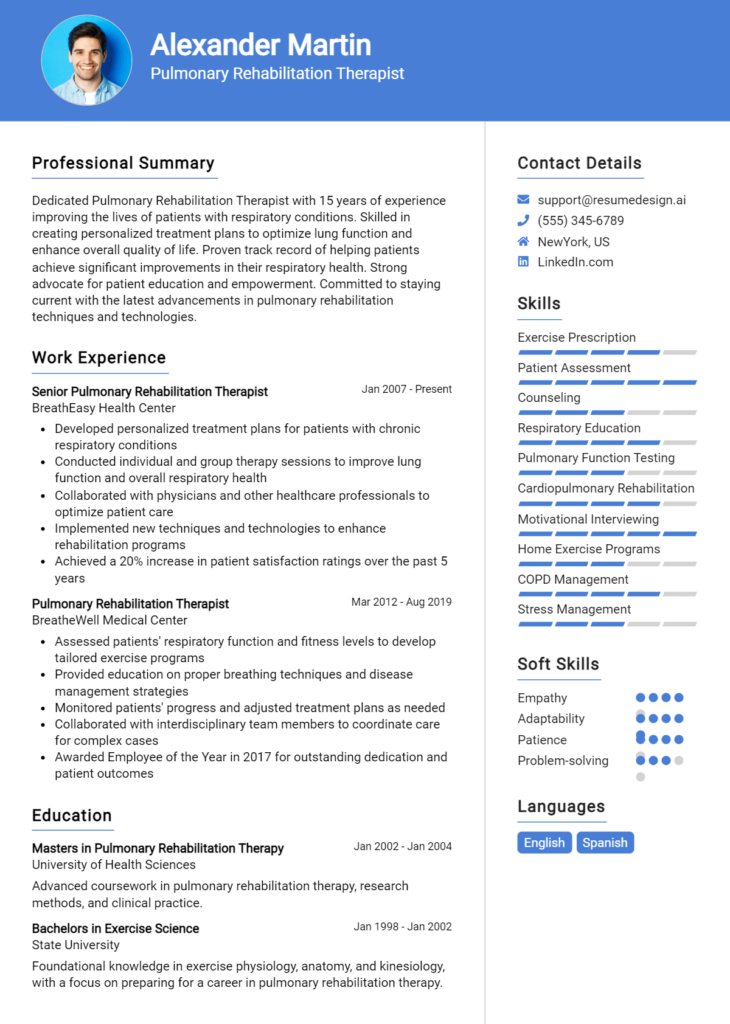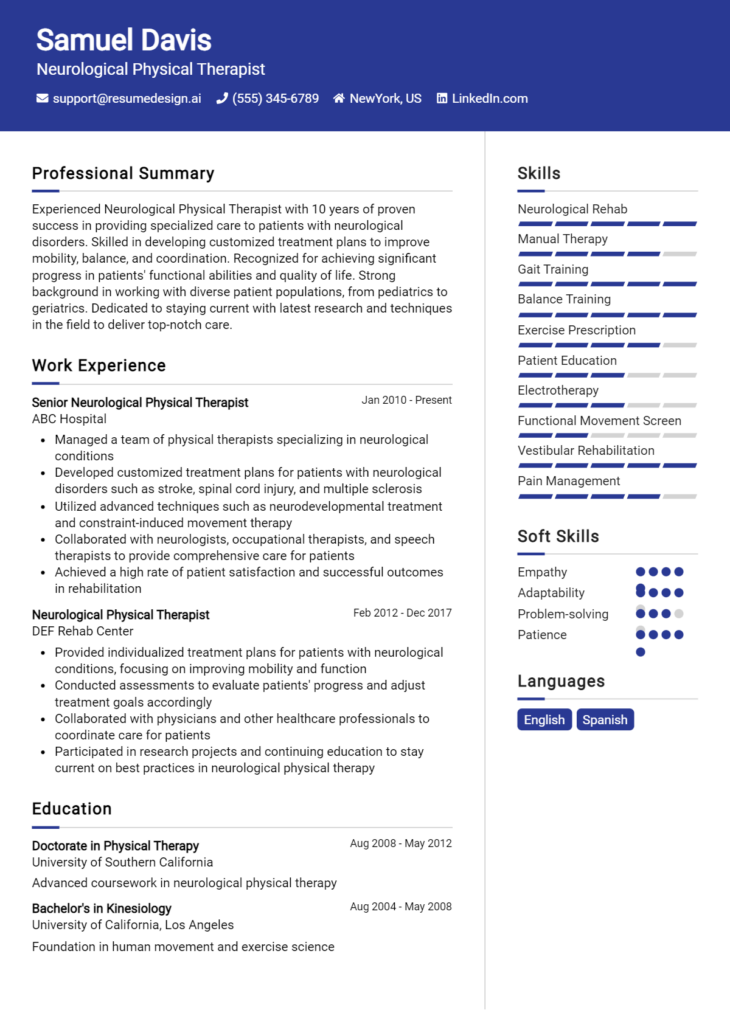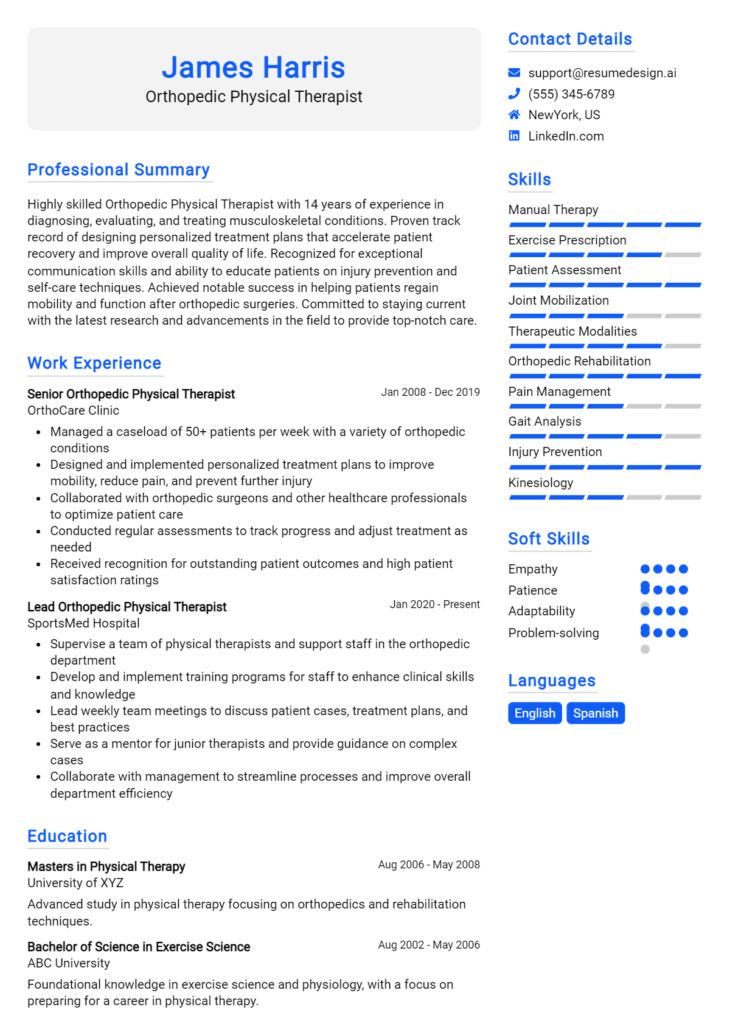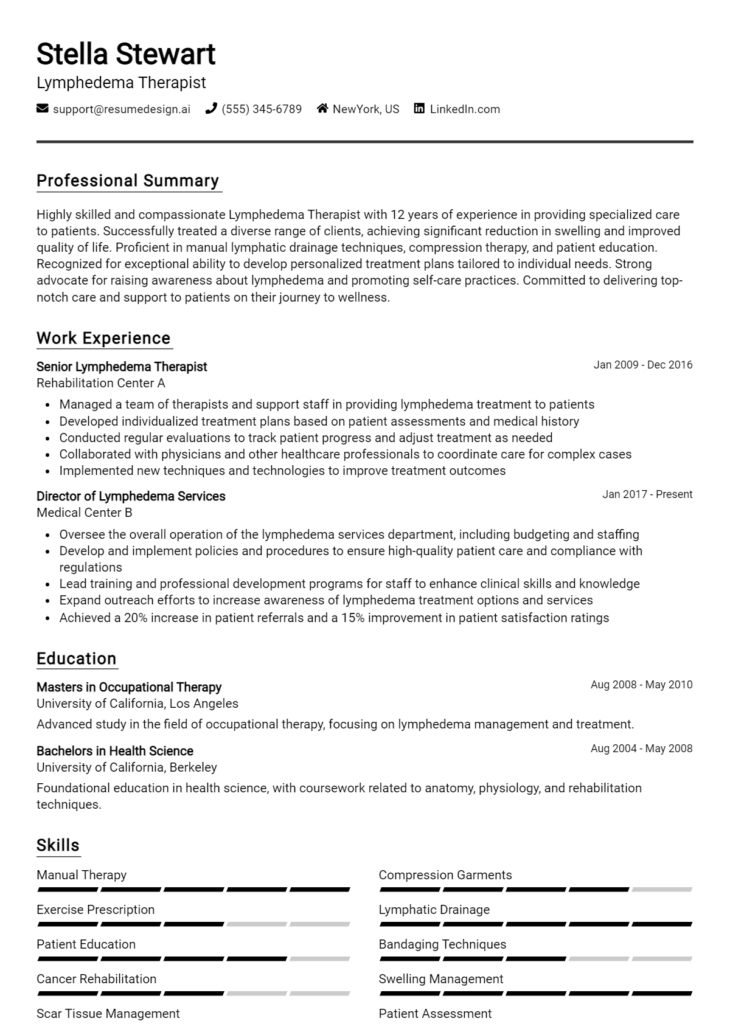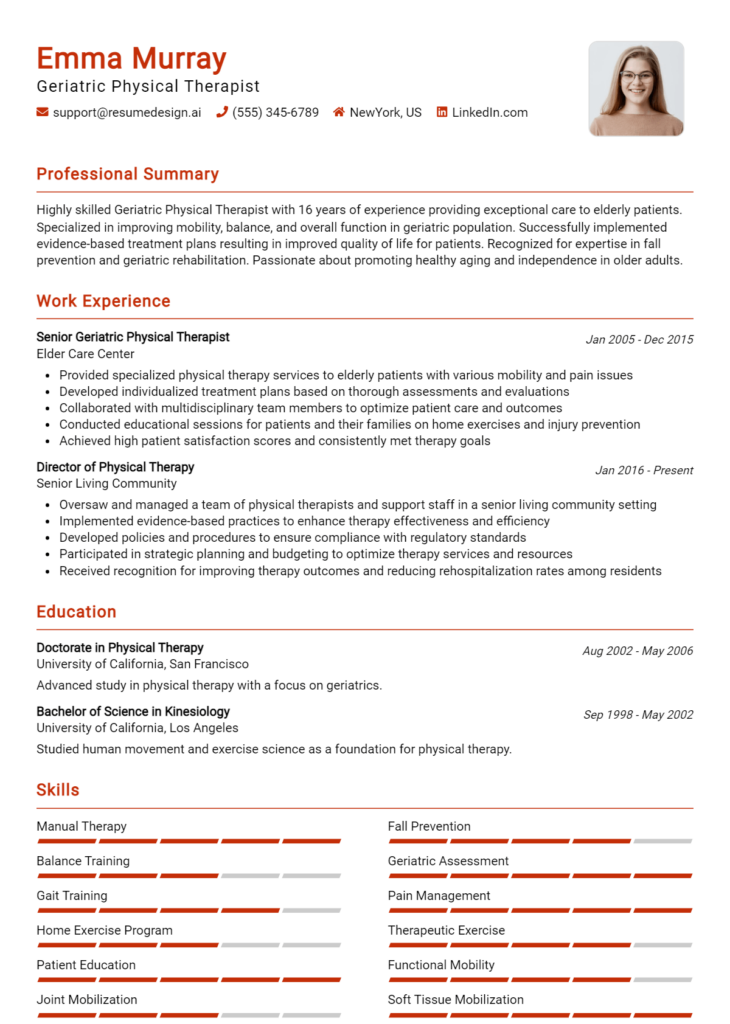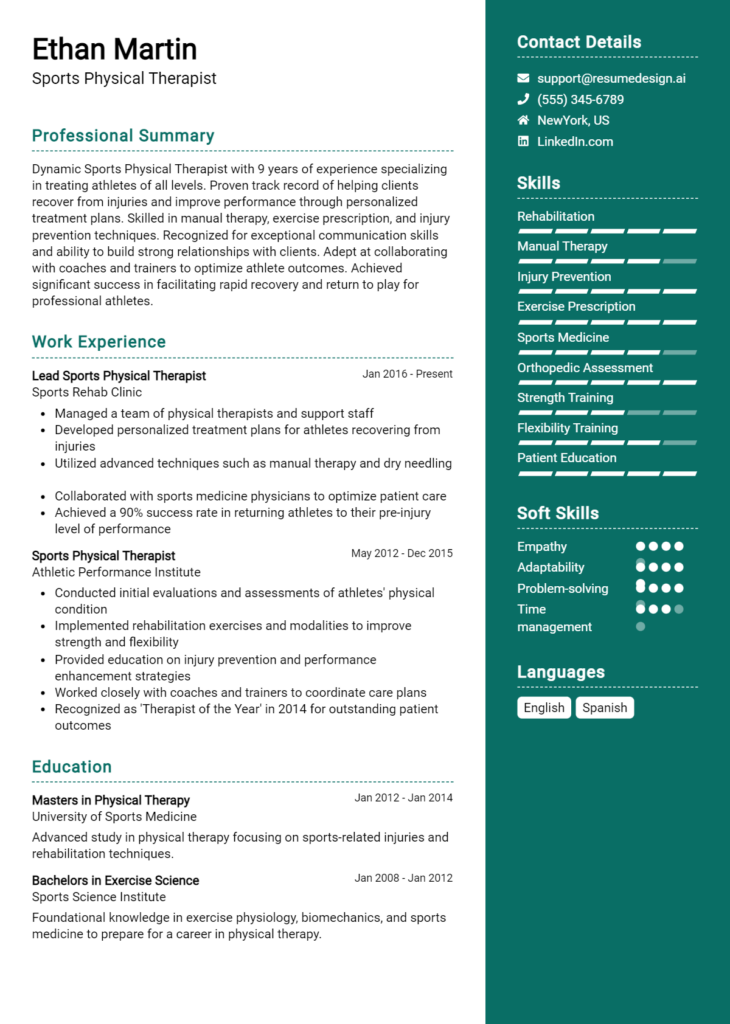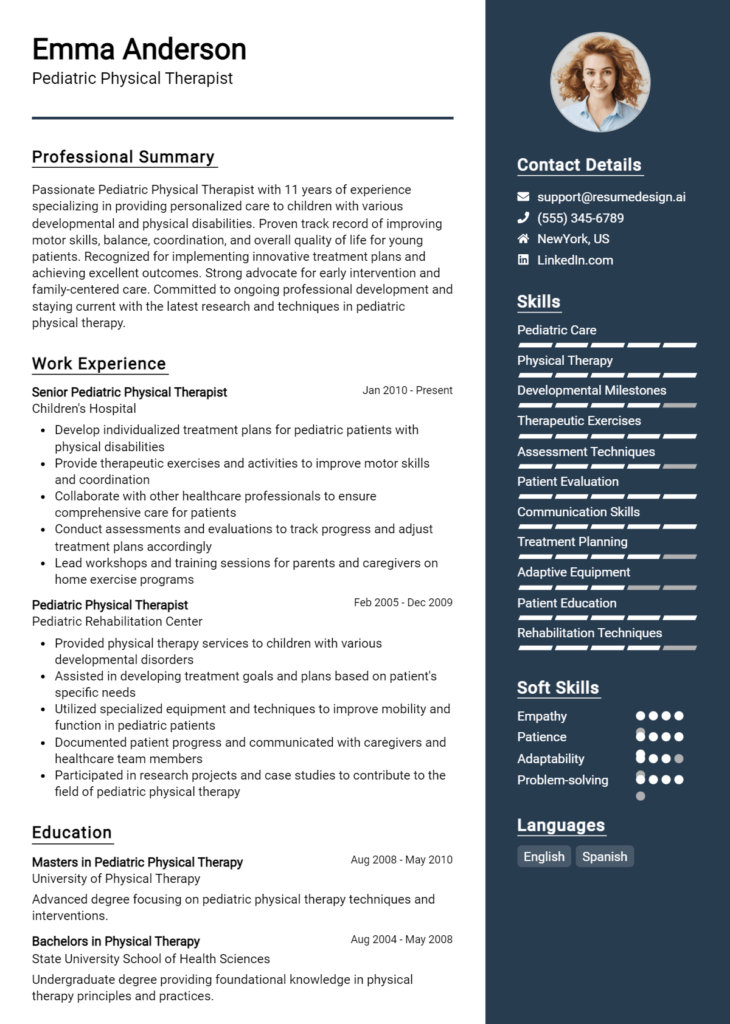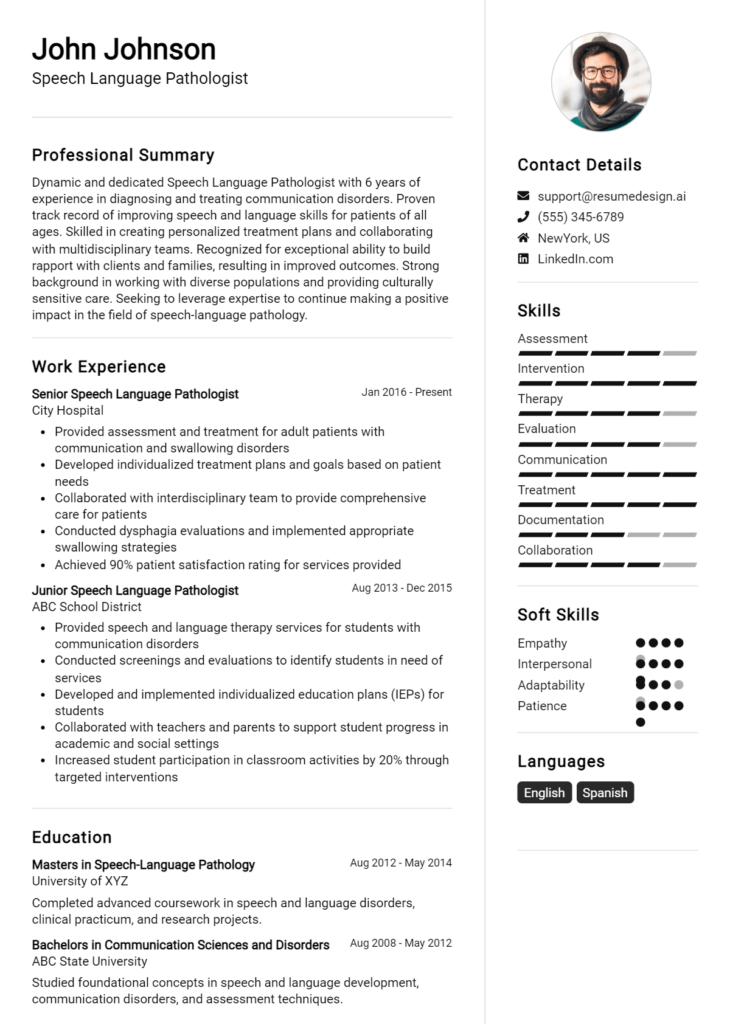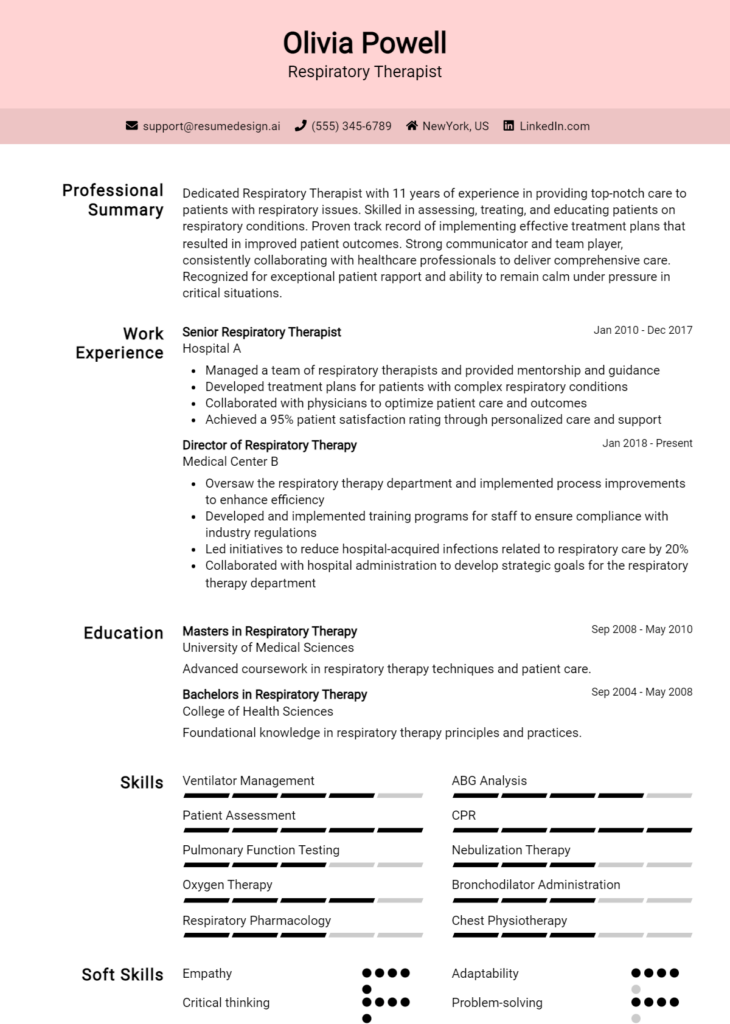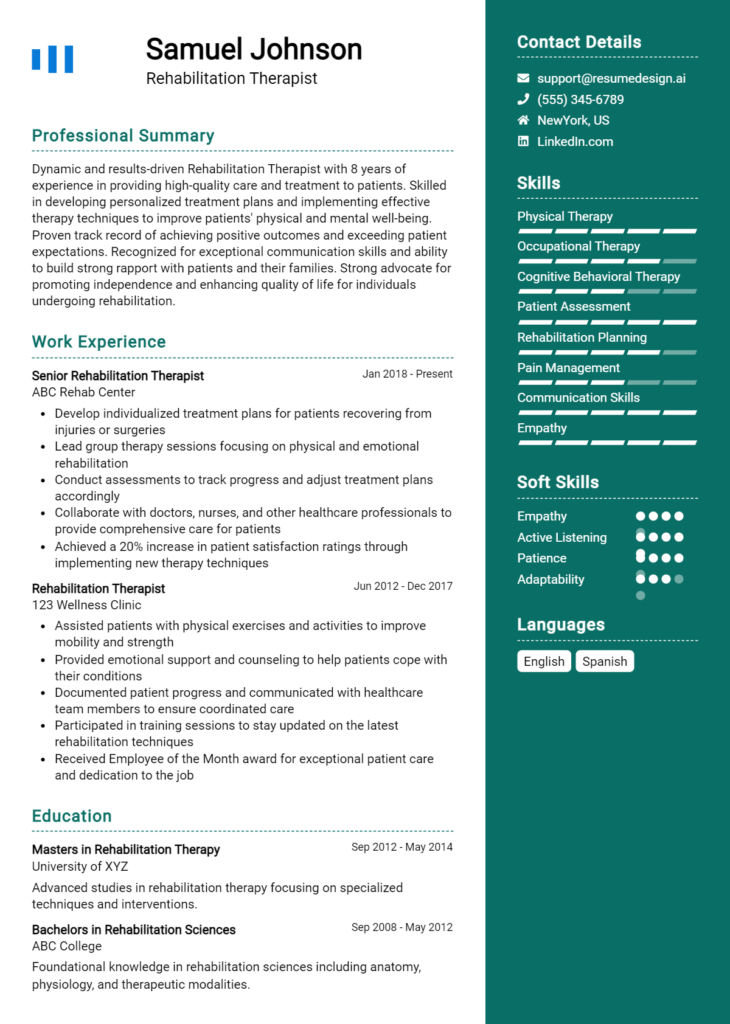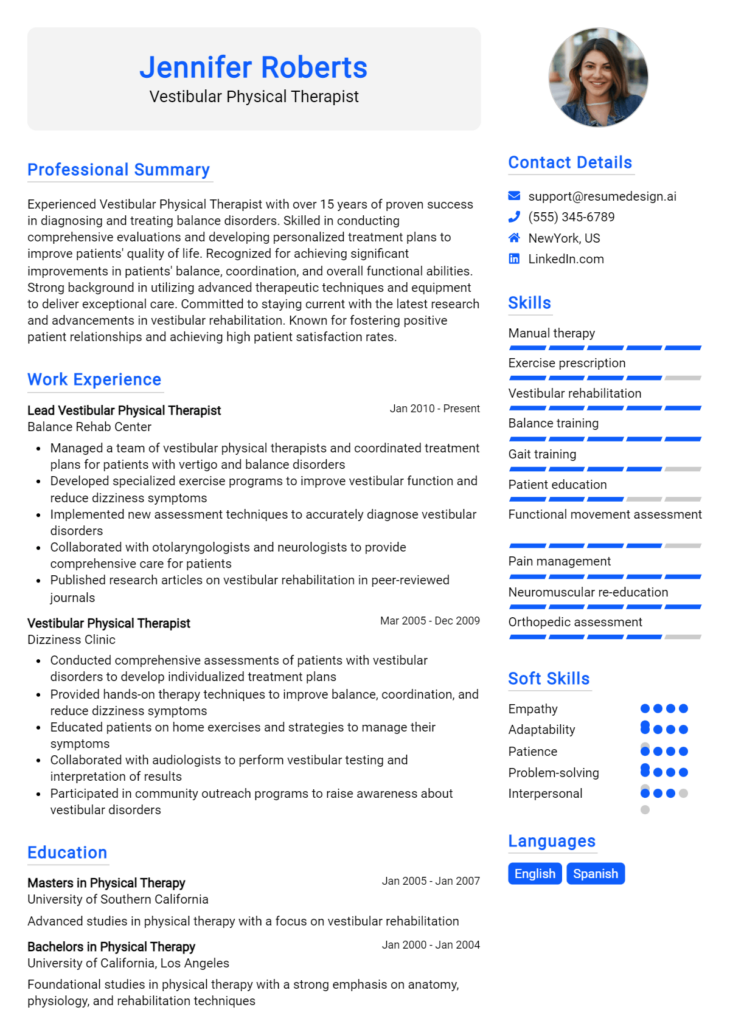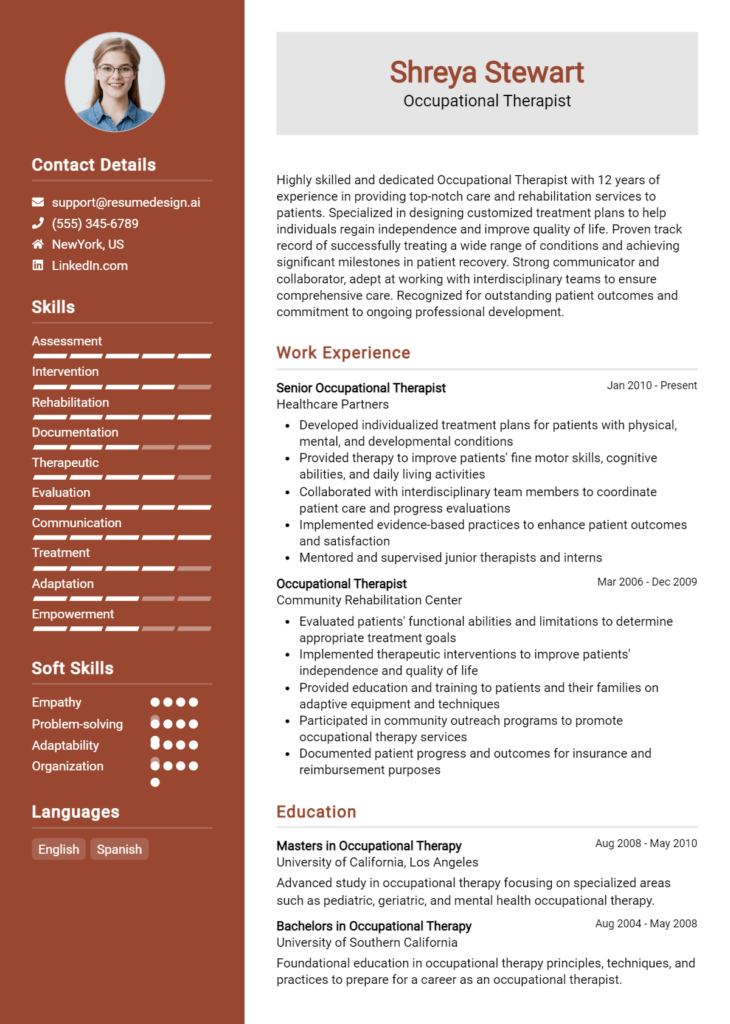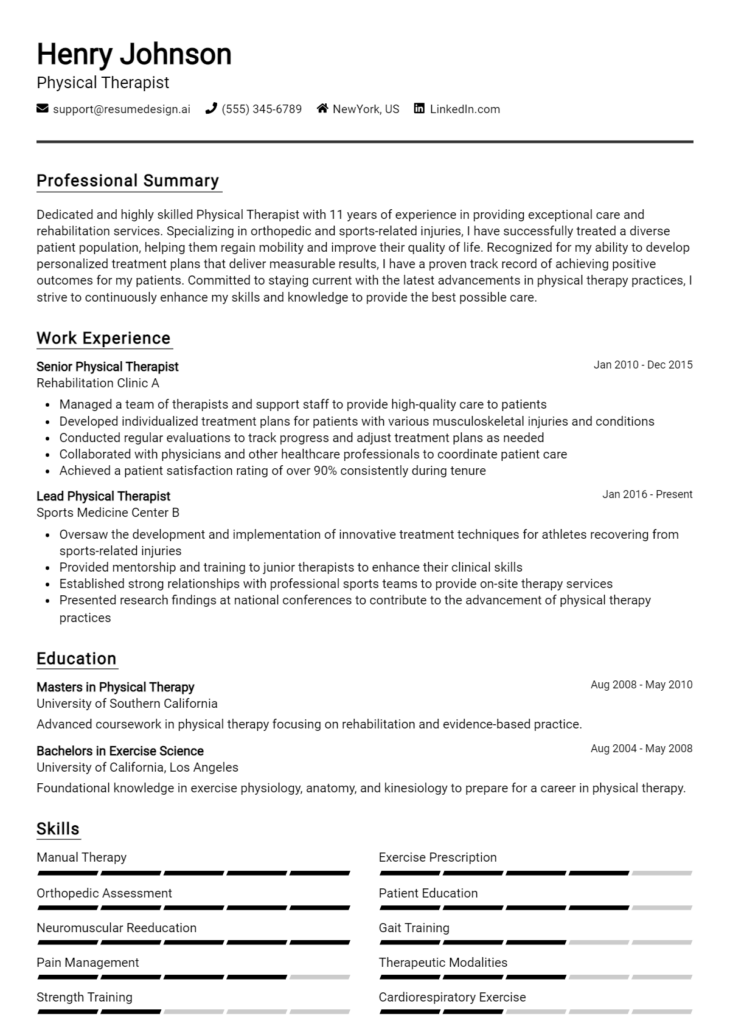Recreational Therapist Core Responsibilities
A Recreational Therapist plays a vital role in enhancing the well-being of individuals through recreational activities tailored to their needs. Key responsibilities include assessing clients’ abilities, developing personalized treatment plans, and implementing therapeutic recreational programs. This role often bridges health care, education, and community services, requiring technical skills in therapy techniques, operational abilities to manage program logistics, and problem-solving skills to address diverse client challenges. A well-structured resume highlighting these qualifications is essential for contributing to the organization's overall goals.
Common Responsibilities Listed on Recreational Therapist Resume
- Conduct assessments to evaluate client needs and abilities.
- Design and implement individualized recreational therapy programs.
- Facilitate group therapy sessions to promote social interaction.
- Monitor client progress and adjust treatment plans as necessary.
- Collaborate with interdisciplinary teams to coordinate care.
- Educate clients and families about therapeutic activities.
- Maintain accurate records and documentation of therapy sessions.
- Organize community outings and recreational events.
- Provide training and support to staff on therapeutic activities.
- Advocate for client rights and access to recreational resources.
- Stay updated on trends and best practices in recreational therapy.
High-Level Resume Tips for Recreational Therapist Professionals
A well-crafted resume is a crucial tool for Recreational Therapist professionals, as it serves as the first impression a candidate makes on potential employers. In a field where creativity, empathy, and specialized skills are essential, your resume must effectively reflect your qualifications, experiences, and achievements. A strong resume not only highlights your capabilities but also showcases how you can contribute to improving the well-being of clients through tailored therapeutic activities. This guide will provide practical and actionable resume tips designed specifically for Recreational Therapist professionals, helping you stand out in a competitive job market.
Top Resume Tips for Recreational Therapist Professionals
- Tailor your resume to the specific job description, using keywords and phrases that align with the requirements of the position.
- Showcase relevant experience, including internships, volunteer work, and any specialized programs you have developed or implemented.
- Quantify your achievements where possible, such as the number of clients served or improvements in client outcomes due to your interventions.
- Highlight industry-specific skills, such as knowledge of therapeutic modalities, assessment techniques, and client-centered care practices.
- Include relevant certifications and licenses, ensuring they are prominently displayed in your qualifications section.
- Utilize a clean and professional format that is easy to read, allowing hiring managers to quickly identify your key qualifications.
- Incorporate a summary statement that succinctly conveys your passion for recreational therapy and outlines your professional goals.
- Emphasize your ability to work collaboratively with multidisciplinary teams to create comprehensive treatment plans.
- Include any continuing education or professional development related to recreational therapy to demonstrate your commitment to the field.
By implementing these tips, you can significantly enhance your resume, making it more appealing to hiring managers in the Recreational Therapist field. A well-structured and tailored resume not only increases your chances of landing an interview but also positions you as a strong candidate ready to make a positive impact in the lives of clients through therapeutic recreation.
Why Resume Headlines & Titles are Important for Recreational Therapist
In the competitive field of recreational therapy, having a well-crafted resume headline or title is crucial for standing out among applicants. A strong resume headline serves as the first impression for hiring managers, instantly capturing their attention and summarizing a candidate's key qualifications in a concise and impactful manner. This strategic phrase should be tailored to the specific job being applied for, ensuring relevance and clarity to showcase the candidate’s unique strengths and expertise in recreational therapy. By effectively highlighting core competencies, a powerful headline can significantly enhance a resume's appeal, making it more likely to attract the interest of prospective employers.
Best Practices for Crafting Resume Headlines for Recreational Therapist
- Keep it concise and to the point, ideally under 10 words.
- Ensure it directly relates to the specific role being applied for.
- Highlight key qualifications, skills, or experiences that align with the job description.
- Use action-oriented language that conveys enthusiasm and professionalism.
- Avoid jargon or overly complex language that may confuse readers.
- Incorporate relevant certifications or specialties to stand out.
- Consider including quantifiable achievements or metrics where possible.
- Make sure the headline is free of grammatical errors and typos to maintain professionalism.
Example Resume Headlines for Recreational Therapist
Strong Resume Headlines
Certified Recreational Therapist with 5+ Years of Experience in Pediatric Care
Dynamic Recreational Therapist Specializing in Neurorehabilitation and Patient Engagement
Results-Driven Recreational Therapist Focused on Enhancing Quality of Life for Seniors
Compassionate Recreational Therapist with Proven Success in Community-Based Programs
Weak Resume Headlines
Therapist Looking for Job
Recreational Therapy Professional
The strong headlines are effective because they provide specific information about the candidate's qualifications, areas of expertise, and years of experience, making them immediately relevant to hiring managers. They convey a sense of professionalism and purpose, showcasing the candidate’s unique attributes in a compelling way. Conversely, the weak headlines fail to impress due to their vagueness and lack of detail. They do not communicate the candidate's specific strengths or experiences, making it difficult for employers to recognize their potential value to the organization.
Writing an Exceptional Recreational Therapist Resume Summary
A well-crafted resume summary is crucial for a Recreational Therapist, as it serves as the first impression for hiring managers. This brief yet impactful introduction quickly captures attention by highlighting key skills, relevant experience, and notable accomplishments that align with the job role. A strong summary should be concise, directly tailored to the specific position being applied for, and designed to demonstrate the candidate's unique qualifications, ensuring they stand out in a competitive job market.
Best Practices for Writing a Recreational Therapist Resume Summary
- Quantify Achievements: Use specific numbers or outcomes to illustrate your impact.
- Focus on Relevant Skills: Highlight skills that directly relate to the job description.
- Tailor for the Job: Customize your summary to align with the specific role you are applying for.
- Be Concise: Keep your summary brief, ideally between 2-4 sentences.
- Use Action Verbs: Start sentences with strong action verbs to convey your experience dynamically.
- Showcase Certifications: Mention any relevant certifications or licenses that bolster your qualifications.
- Include Soft Skills: Highlight interpersonal skills that are crucial for effective therapy practices.
- Reflect Passion: Convey your enthusiasm for recreational therapy and working with diverse populations.
Example Recreational Therapist Resume Summaries
Strong Resume Summaries
Dedicated Recreational Therapist with over 5 years of experience in developing and implementing therapeutic programs for individuals with physical disabilities. Successfully increased patient engagement by 30% through innovative group activities and one-on-one sessions, fostering both emotional and physical rehabilitation.
Compassionate Recreational Therapist with a Master’s degree in Therapeutic Recreation and a proven track record of improving client outcomes. Enhanced quality of life for 100+ patients by designing tailored recreational programs, leading to a 40% increase in overall satisfaction ratings.
Results-driven Recreational Therapist skilled in adaptive sports and community engagement, with over 3 years of experience in a clinical setting. Achieved a 25% improvement in patient mobility scores by introducing specialized outdoor activities and personalized therapy plans.
Weak Resume Summaries
Recreational Therapist looking for a job in therapy. I have experience in various activities and enjoy helping people.
Experienced therapist seeking opportunities to use my skills in a recreational setting. I am passionate about helping others and have worked with different groups.
The strong resume summaries are effective because they provide specific achievements, quantify results, and demonstrate direct relevance to the Recreational Therapist role. They highlight the candidate’s unique qualifications and showcase measurable impacts on patient care. In contrast, the weak resume summaries lack specificity and quantifiable outcomes, making them too generic and less compelling to potential employers.
Work Experience Section for Recreational Therapist Resume
The work experience section of a Recreational Therapist resume is crucial as it serves as a platform to showcase the candidate's technical skills, leadership capabilities, and the quality of care they can deliver. This section not only highlights the practical application of therapeutic techniques and interventions but also demonstrates the candidate's ability to manage teams effectively and produce positive outcomes for clients. By quantifying achievements and aligning experiences with industry standards, candidates can create a compelling narrative that underscores their qualifications and readiness to excel in the role of a Recreational Therapist.
Best Practices for Recreational Therapist Work Experience
- Detail specific recreational therapy techniques and interventions used to highlight technical expertise.
- Quantify achievements by including metrics such as improved patient outcomes, participation rates, or program attendance.
- Emphasize collaboration by showcasing experiences working with multidisciplinary teams and community partners.
- Include leadership roles or responsibilities that demonstrate management skills and the ability to guide others.
- Tailor each experience to align with job descriptions, using relevant keywords and phrases from the industry.
- Focus on continuous professional development, such as certifications or training that enhance therapeutic practices.
- Use action verbs to convey a sense of initiative and proactivity in each role.
- Highlight unique programs or initiatives developed that contributed to client engagement and satisfaction.
Example Work Experiences for Recreational Therapist
Strong Experiences
- Developed and implemented a community-based recreational therapy program that increased participant engagement by 40% over six months.
- Led a team of five therapists in a multidisciplinary approach to treatment, resulting in a 25% improvement in client satisfaction scores.
- Designed and executed a therapeutic arts initiative that contributed to a 30% reduction in anxiety levels among participants as measured by pre- and post-program surveys.
- Managed a comprehensive recreational therapy program for a diverse population, successfully achieving a 20% increase in overall participation rates.
Weak Experiences
- Worked with patients in a recreational setting.
- Helped to organize activities without specific outcomes.
- Participated in team meetings and discussions.
- Assisted in various recreational programs as needed.
The examples listed as strong experiences are considered effective because they provide specific, quantifiable outcomes that demonstrate the candidate's impact within their roles. They highlight leadership abilities, effective collaboration, and measurable successes, making them compelling to potential employers. Conversely, the weak experiences lack detail and clarity, failing to communicate the candidate's contributions or achievements, thus diminishing their overall effectiveness in showcasing relevant qualifications.
Education and Certifications Section for Recreational Therapist Resume
The education and certifications section of a Recreational Therapist resume plays a crucial role in establishing the candidate's qualifications and expertise in the field. It serves to highlight the academic background, showcasing relevant degrees, and emphasizes the importance of industry-recognized certifications that enhance the therapist's credibility. Additionally, this section reflects the candidate's commitment to continuous learning through specialized training and coursework, demonstrating their willingness to stay current in the field. By providing detailed information about educational qualifications and certifications, candidates can effectively align themselves with the specific requirements of the job role, thereby increasing their chances of standing out to potential employers.
Best Practices for Recreational Therapist Education and Certifications
- List relevant degrees such as a Bachelor's or Master's in Recreational Therapy or a related field.
- Include certifications such as Certified Therapeutic Recreation Specialist (CTRS) to demonstrate industry recognition.
- Highlight any specialized training or workshops attended that are pertinent to recreational therapy.
- Provide coursework that is directly applicable to the role, such as adaptive sports, therapeutic interventions, and assessment techniques.
- Use clear and concise language to describe your educational achievements and certifications.
- Keep the section updated with any new certifications or degrees obtained.
- Organize the information chronologically or by relevance to make it easy for employers to scan.
- Consider including any honors or recognitions received during educational pursuits to add credibility.
Example Education and Certifications for Recreational Therapist
Strong Examples
- Bachelor of Science in Recreational Therapy, University of XYZ, May 2021
- Certified Therapeutic Recreation Specialist (CTRS), National Council for Therapeutic Recreation Certification, 2022
- Coursework in Adaptive Sports and Recreation Therapy Techniques, University of XYZ
- Advanced Certification in Wilderness Therapy, ABC Training Institute, 2023
Weak Examples
- Associate Degree in General Studies, Community College, 2019
- Certification in First Aid/CPR, 2018 (not specific to recreational therapy)
- Unrelated coursework in Business Management, University of XYZ
- Outdated certification as a Recreational Assistant from 2015
The examples provided are considered strong because they directly relate to the field of recreational therapy and demonstrate the necessary qualifications that employers seek. They showcase relevant degrees and current certifications that establish the candidate's expertise and commitment to the profession. In contrast, the weak examples highlight irrelevant or outdated qualifications that do not align with the role, which could detract from the candidate's overall appeal. By focusing on strong, relevant educational and certification credentials, candidates can effectively position themselves as qualified professionals in the recreational therapy field.
Top Skills & Keywords for Recreational Therapist Resume
As a Recreational Therapist, showcasing your skills on your resume is crucial for demonstrating your ability to promote physical, emotional, and social well-being through recreational activities. Employers seek candidates who possess a blend of hard and soft skills that reflect their expertise in therapeutic practices as well as their ability to connect with clients. A well-crafted resume that highlights these skills can set you apart in a competitive job market and ensure that you effectively communicate your qualifications. For more information on how to effectively showcase your skills and work experience, continue reading.
Top Hard & Soft Skills for Recreational Therapist
Soft Skills
- Empathy
- Communication
- Active Listening
- Problem-Solving
- Teamwork
- Patience
- Adaptability
- Creativity
- Motivation
- Conflict Resolution
Hard Skills
- Knowledge of Therapeutic Recreation Techniques
- Assessment and Evaluation
- Program Development
- Group Facilitation
- Knowledge of Disabilities and Health Conditions
- Activity Planning
- Documentation and Reporting
- CPR and First Aid Certification
- Knowledge of Safety Protocols
- Familiarity with Recreational Equipment
Stand Out with a Winning Recreational Therapist Cover Letter
As a dedicated and passionate Recreational Therapist with over five years of experience in diverse healthcare settings, I am excited to apply for the position at your facility. My background in designing and implementing therapeutic recreational programs has equipped me with the skills necessary to enhance the quality of life for individuals of all ages and abilities. I am particularly drawn to your organization’s commitment to holistic care and community engagement, which aligns perfectly with my own professional philosophy.
In my previous role at XYZ Rehabilitation Center, I successfully developed and facilitated innovative recreational therapy activities tailored to the needs of patients recovering from physical and mental health challenges. By utilizing a variety of modalities such as group games, arts and crafts, and outdoor adventures, I was able to promote not only physical rehabilitation but also social interaction and emotional well-being. My collaborative approach allowed me to work closely with multidisciplinary teams to create comprehensive treatment plans that addressed each patient’s unique goals and aspirations.
I am adept at assessing client needs and measuring progress, utilizing evidence-based practices to ensure effective outcomes. My experience working with diverse populations, including seniors, individuals with disabilities, and children with behavioral challenges, has honed my ability to adapt programs to meet varying needs. I am also committed to fostering a safe and supportive environment where clients feel encouraged to participate and express themselves. I believe this is essential for building trust and facilitating personal growth in recreational therapy.
Enthusiastic about the opportunity to contribute to your team, I am eager to bring my creativity, compassion, and expertise in recreational therapy to your organization. I look forward to the possibility of discussing how my skills and experiences can align with your mission to provide exceptional care and support to the community. Thank you for considering my application; I hope to connect soon to explore this opportunity further.
Common Mistakes to Avoid in a Recreational Therapist Resume
When crafting a resume for a Recreational Therapist position, it's essential to present yourself in the best light possible. However, many candidates make common mistakes that can undermine their chances of landing an interview. By being aware of these pitfalls, you can ensure that your resume effectively showcases your skills, experiences, and qualifications. Below are some common mistakes to avoid when creating your Recreational Therapist resume:
Vague Objective Statements: Using a generic objective that doesn’t directly relate to the position can make your resume forgettable. Tailor your objective to reflect your passion for recreational therapy and your specific career goals.
Ignoring Relevant Experience: Failing to highlight relevant volunteer work, internships, or previous roles in recreational therapy can lead employers to overlook your qualifications. Be sure to include all pertinent experiences that showcase your skills.
Overloading with Jargon: While it's important to include industry-specific terminology, overusing jargon can alienate readers who may not be familiar with all the terms. Aim for clarity to ensure your resume is accessible to all hiring managers.
Lack of Quantifiable Achievements: Simply listing responsibilities without presenting measurable achievements can weaken your resume. Whenever possible, include data or specific outcomes that demonstrate the impact of your work.
Inconsistent Formatting: A resume with inconsistent font styles, sizes, or spacing can appear unprofessional and may distract from your qualifications. Stick to a clean, uniform format throughout your document.
Neglecting Soft Skills: Recreational therapy relies heavily on interpersonal skills. Failing to emphasize your communication, empathy, and teamwork abilities can result in a missed opportunity to connect with potential employers.
Not Tailoring the Resume: Sending the same resume for every job application can make you seem disinterested. Customize your resume for each position by aligning your skills and experiences with the specific job description.
Skipping Proofreading: Typos and grammatical errors can create a negative impression and suggest a lack of attention to detail. Always proofread your resume multiple times, and consider asking someone else to review it as well.
Conclusion
As a Recreational Therapist, your role is vital in enhancing the physical, emotional, and social well-being of individuals through engaging activities. You utilize various therapeutic techniques and recreational activities to promote health and recovery, making your resume a key element in showcasing your skills, experiences, and certifications.
In crafting your resume, it’s important to emphasize your expertise in assessment, intervention planning, and activity facilitation. Highlight any relevant certifications, such as CTRS (Certified Therapeutic Recreation Specialist), and specific experience working with diverse populations, including children, the elderly, or individuals with disabilities. Tailoring your resume to reflect your unique qualifications and the requirements of the job you’re applying for will help you stand out to potential employers.
To ensure your resume is polished and effective, consider using available resources that can simplify the process. Explore resume templates to find a format that suits your style and profession. Utilize the resume builder for a guided approach to creating your document, or look at resume examples for inspiration on how to present your experiences effectively. Don’t forget to complement your resume with a strong introduction through cover letter templates, which can help you convey your passion for the field and your suitability for the role.
Now is the perfect time to review and revamp your Recreational Therapist resume. Take advantage of these tools to enhance your chances of landing your dream job in the therapeutic recreation field.

